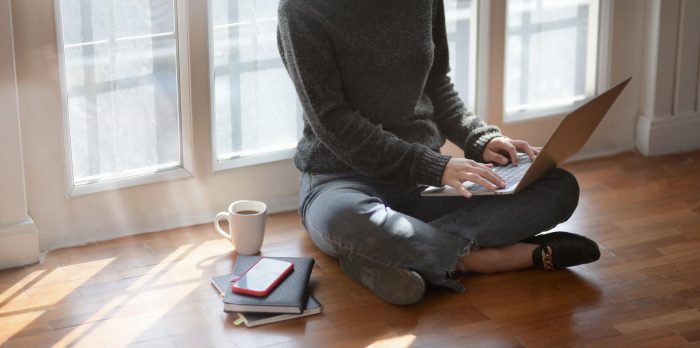We psychotherapists are traversing through uncharted waters.
We have been conducting our sessions through a telehealth lens for at least a month, and we may be starting to feel the effects of staring at a screen with intense, sustained focus toward our clients—both intellectually and emotionally—for most of our workdays.
We may also be surprised to find ourselves feeling exhausted at the end of each workday.
I mean bone tired.
I started to notice this feeling a few weeks into my telehealth practice and chalked it up to the emotional effects of the pandemic, quarantining, and social distancing. I even wrote about the effects of trauma and helplessness.
But this feels different. And it feels specific to our work as psychotherapists.
Like me, you may have started to feel concerned about your end of the day exhaustion—the physical and mental fatigue. And maybe to the point where, like me, you wondered if you could possibly continue telehealth sessions.
I don’t know about you, but it was deeply worrisome for me. What’s wrong with me? Is it my lack of skills?
I have been in the psychology field for almost 30 years, since my undergraduate studies, where I majored in Psychology. And before that, I would accompany my mom who was a psychiatric nurse to her patient rounds in the psychiatric hospital.
I love my work. I feel grateful to consider it one of my life’s callings. And, I love being a psychotherapist and creating therapeutic relationships with my clients—relationships that have been helpful for both me and them. Which is why I was so surprised to be feeling so worn down at the end of each workday and unable to feel refreshed and recharged after the weekend.
No doubt, our emotional and physical exhaustion comes from the trauma inflicted by this pandemic. But I always thought my love for my work would be enough to endure whatever challenges found their way onto my professional path.
Well, that fairy-tale delusion carried me for the first few weeks, but now we are here, almost two months into quarantining, and I have a sense we will be doing “the hammer and the dance” for the next year or more. So, like any marital therapist worth their salt says, “It takes more than love to endure challenging times.”
We all feel exhausted.
How the hell are we going to survive these upcoming telehealth seasons, while both being of service to our clients, and preserving our own well-being?
Here are some suggestions:
1. Check in frequently about the telehealth process with your clients and ask them how it’s going for them.
They may need to talk about the awkwardness of it, or they may say that they prefer you to be closer or farther away from the camera. Also, I’m certain I’m not sensing everything that my client is feeling while using telehealth platforms, so I will often check in to make sure I am understanding what they are sharing with me, and I’ll ask whether I am missing something.
2. Lights, camera, relax!
I realized one of the reasons I was so exhausted was because I was essentially “on” all day. Being on camera, no matter the size or scale, can feel as if we are being constantly observed and monitored—by ourselves and the client. If we sit more relaxed in our chair and gaze elsewhere periodically, we may feel more relaxed and less scripted. We can even go so far as to put a sticky note over our small live profile shot to reduce distractions and self-consciousness.
3. Can you hear me now?
Another contributor to my exhaustion has been straining to hear my clients because of poor audio or poor internet connection. It already takes effort to actively listen, which is compounded when we have to decipher what our client is saying in between missed words. Using earbuds or headphones can ease the audio strain. And if your audio is struggling, rather than delaying and hoping it gets better, try a different telehealth platform or a phone call; this reduces unnecessary strain, and it maintains some fluidity through the session.
4. Eyeball-to-eyeball versus shoulder-to-shoulder.
Christine Padesky, PhD, recommends that we split up “eyeball-to-eyeball” talk therapy, where there is intensive eye contact, with other therapeutic “shoulder-to-shoulder” activities. For example, we might suggest a thoughtful writing exercise that can then be shared in session, or we can practice a brief mindful meditation. This may help reduce the pressure of constant “captive audience attention” and provide other ways to emotionally process in session.
5. Space between sessions.
I used to pride myself on being able to see multiple clients back-to-back. No can do, no more. I schedule in more breaks throughout my day and do not schedule more than four clients in a row. This has greatly helped my stamina and endurance throughout the day. Pride and self-competition have no place in this pandemic. If we need to set goals, it is to get through this pandemic alive and intact emotionally.
6. Me, me, me.
Yes, this is the perfect time to start prioritizing (for all you latecomers) yourself. Again, there is no pride in being a martyr, especially during quarantine. This is a journey with no specific destination. Every day we must find one way to take care of ourselves. Find your method and do it, without exception or apologies.
“If your compassion does not include yourself, it is incomplete.” ~ Jack Kornfield
This is not an exhausted list (no pun intended), and as mental health collaborators we can work together and support one another in ways to make our telehealth practices more sustainable. If you are struggling beyond the scope of these coping skills, please carry no shame in that, and reach out for help with your own therapist, colleagues, family, and friends.
Here is the American Psychological Association’s resource page to support telehealth services.
“If you can sit quietly after difficult news; if in financial downturns you remain perfectly calm; if you can see your neighbors travel to fantastic places without a twinge of jealousy; if you can happily eat whatever is put on your plate; you can fall asleep after a day of running around without a drink or a pill; if you can always find contentment just where you are: you are probably a dog.” ~ Jack Kornfield
~











Read 6 comments and reply